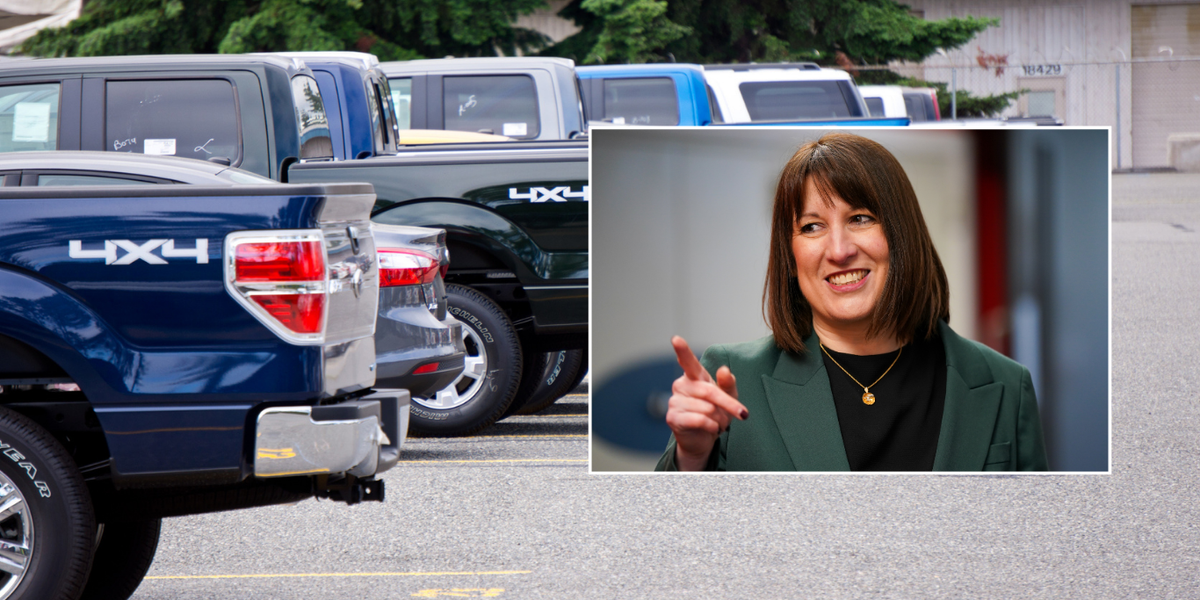Rachel Reeves has been forced to update the car tax changes guidance for a certain vehicle type amid widespread confusion.
In response, HMRC has updated its guidance on the taxation of double cab pick-up trucks, stating that they would be subject to company car tax from April.
The clarification comes just weeks before new Vehicle Excise Duty rules take effect on April 1 which will see double cab pick-ups treated as company cars for tax purposes.
The change will significantly increase the Benefit-in-Kind (BIK) tax paid by drivers, with some facing additional annual costs of thousands of pounds.
Do you have a story you’d like to share? Get in touch by emailingmotoring@gbnews.uk
From April 1 double pick up trucks will be reclassified as company cars with drivers forced to pay more tax
PA/GETTY
Under the tax changes, a typical Ford Ranger, which typically costs around £60,000, will incur an annual BiK value of £4,020, resulting in yearly tax payments of £804 for basic rate taxpayers and £1,608 for higher rate taxpayers.
It follows the launch of a petition which calls on the Government to remove controversial changes to pickup truck tax rules.
The petition, which has already gained thousands of signatures, detailed: “We call on the Government to reverse the recent decision announced in the 2024 Autumn Budget to reclassify double cab pickup vehicles with a payload of one tonne or more as cars for certain tax purposes.
“We think this change will harm many businesses, farmers, tradespeople, and individuals relying on double cab pickups for work, making work vehicles costly. We think reclassifying them as cars drastically raises costs by increasing Benefit in Kind tax and lowering their capital allowances. Reconsider the change and engage affected industries.”
Now, HMRC has updated its guidance – which aims to provide clarity for businesses ahead of the April implementation date.In its initial guidance, HMRC had defined double cab pick-ups as requiring four doors that could be opened independently, alongside other criteria such as seating for four passengers plus driver.
However, this week’s updated definition has now removed the requirement for independently opening doors. The new guidance simply states the vehicle must have “four doors, whether the rear doors are hinged at the front or the rear” to be considered a double cab pick-up for BIK purposes.
HMRC added that most double cab pick-ups will likely be classified as cars when calculating the benefit charge. This classification applies because these vehicles are typically “equally suited to convey passengers and goods and have no predominant suitability,” the document stated.
The updated definition will now mean that extended, extra, king and super cab vehicles, such as the Toyota Hilux Extra Cab, will now be subject to company car tax.
This marks a significant expansion of vehicles falling under the new tax rules.“The market options for single cab pick-ups continue to shrink and extended cab options gave us the ability to offer an enhanced specification vehicle for our drivers,” said one fleet manager who had been considering ordering extended cab pick-ups.
However, HMRC has indicated it will not provide blanket decisions on whether specific makes or models should be regarded as cars or vans for BIK purposes.
This is because standard versions may have been adapted in the factory, by dealerships, or after purchase by employers.
When the Government announced the changes, a Treasury spokesperson said: “The Government announced that HMRC will change its guidance on the tax treatment of DCPUs (double cab pick-ups) to align with case law, reflecting the Court of Appeals judgement that multipurpose vehicles which are equally suited to carrying people and goods should be treated as cars. It is right that their tax takes into account the purpose for which they are primarily suited.”
LATEST DEVELOPMENTS:
As part of the HMRC update, more vehicles will be subject to Benefit-in-Kind taxes
TOYOTA
HMRC has confirmed that the VAT position for affected vehicles will remain unchanged despite the new BIK tax rules. There will also be no impact on the level of VED that fleets need to pay.
To help businesses adapt to the changes, transitional arrangements have been put in place for employers who have already committed to these vehicles.
Companies that purchased, leased, or ordered double cab pick-ups before April 6, 2025, will be able to continue using the previous tax treatment. This transitional period will last until either the vehicle is disposed of the lease expires, or April 5, 2029 – whichever comes first.
